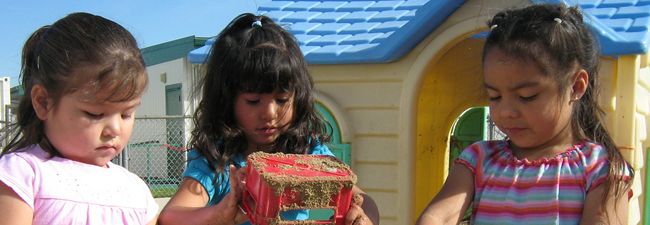planned learning activities
Teaching self-regulation
- Leave teachers with the article “Teaching Children a Vocabulary for Emotions.” Ask teachers to implement one strategy and report out on it at your next meeting. (PCF, p. 42 and PEL Guide, p. 40)
- Provide resources describing relaxation exercises appropriate for children. Discuss with the teacher how stretching and relaxation exercises assist children in self-reflection and build self-regulation skills. Plan with teachers how they may integrate these exercises during group activities and transitions. (PCF, p. 51)
- Guide teachers to page 74 of the Preschool Curriculum Framework and ask that they review the sections on Guiding Principles and involving children in creating examples of expectations. Work with teachers to develop no more than three rules for classroom. Model the process of encouraging the children to provide examples of what compliance might look like in the classroom. Perhaps have children pose for photos of themselves illustrating the guidelines and help the teacher create a rule poster for the classroom using the children’s quotes and photos. (PCF, 74)
Teaching social skills
- Organize a planning session with two or more teachers to plan how to integrate group activities into the following week lesson plan specifically to focus on caring, cooperation, or friendship skills. (PCF, p. 39)
- Together with the teacher, review some favorite children’s books and stories to identify opportunities to highlight social problem solving, cooperative behavior and other social and emotional skills. Talk together about how to use these concepts as discussion points with the children. Share the handout “Children’s Book List” for ideas of books to add to the collection. (PCF, p. 44)
- Create a study group with a group of teachers. Provide each with copies of two articles “Creating Environments for Peaceful Problem Solving” and “Child-Friendly Ideas for Teaching Problem Solving.” A week later, gather the teachers together to discuss how they might use strategies outlined in the article in their own classrooms. Meet regularly to discuss what worked, what didn’t, and ideas for improvement. (PCF, p. 47. 67 and ECERS, p. 60)
- Review a few weeks worth of lesson plans with teachers, looking for “planned group experiences” such as creating a garden or planning for a family night activity. Discuss with teachers the value of adding such experiences to establish community and build shared knowledge as children learn turn-taking skills and cooperative conversation (PCF, p. 71)
- Model the use of books, puppet plays, and group discussions to identify and reinforce friendship skills. Discuss with teachers how Interactions between the characters in a book can lead to discussions about ways to show loyalty to an old friend while including a new one, and the choices children face when playmates have a variety of personality characteristics (PCF, p. 84)
- Help teachers think of specific ways to teach children to successfully engage and interact with a child with special needs. (Inclusion Works! P. 18)
